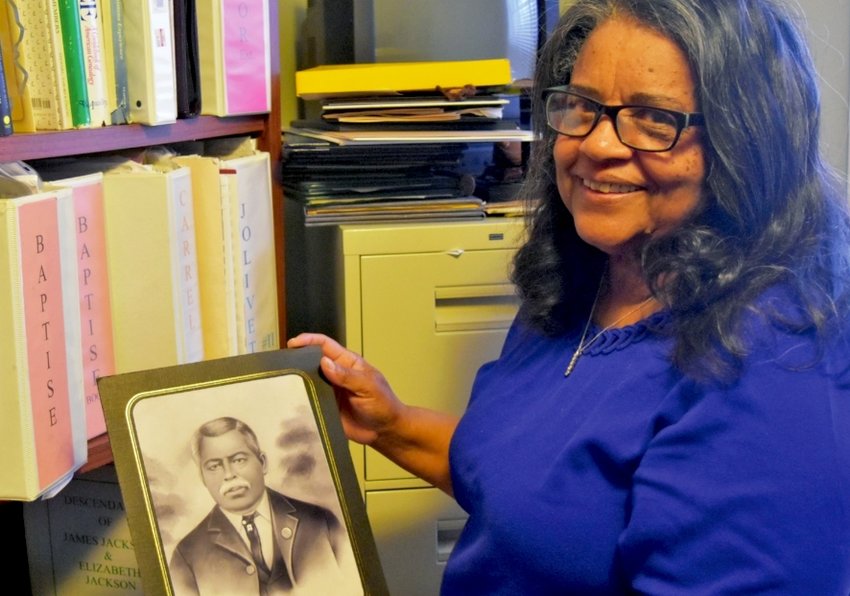
Lansing Area African-American Genealogical Society member poses with a portrait of her relative, John Baptiste.
Hunting through libraries and databases in Michigan and beyond, the Lansing Area African-American Genealogical Society, or LAAAGS, is a group of amateur genealogists focused on uncovering the past lives of their families.
Founded in 2001, the group holds monthly meetings on the latest genealogy resources and shares their discoveries.
Founding member Carrie Jackson has worked on her own genealogy since 1982. As a former librarian with the Library of Michigan, Jackson employs all the research tools at her disposal to track down information. In her work, she obtained both the slave sale and emancipation records of her ancestors. She can trace her lineage back to 1817 … for now.
“I come from a family where we talk about family members and grandparents,” Jackson said. “We kept them alive through stories and photos.”
Every two years, Jackson’s family would have a family reunion and share old photos until this tradition became a research passion.
“I have been at it ever since,” she said.
The near 40 years of research is evident in her office, with dozens of genealogy binders filling up a bookshelf. Her collection is meticulously detailed with records from largest genealogy archive, the Utah Family History Library, to the repositories of her native St. Mary’s parish courthouse in Franklin, Louisiana.
Most of the documents come from the Catholic Church in Louisiana and are written in French. Jackson has paid over $400 to get some translated to English.
“A lot of people had started looking into their family histories after the publishing of Alex Haley’s ‘Roots’ and the movie that followed,” Jackson said. “The fact that Haley could trace his family back to Africa gave us hope that we could too.”
It hasn’t happened for most members, Jackson said.
“When you get to slavery, getting beyond that is very tough — much was lost in terms of records. They were destroyed on purpose or destroyed because the system didn’t consider them human beings.”
American census records from 1790 to 1840 recorded only the heads of households and number of slaves. Things marginally improved from 1850 to 1860, when “free persons of color” were included and all slaves were labeled with description of skin color, age and gender. After the Civil War in 1870, African-Americans were listed by full name in the census.
“My mother used to say our family was of freed people. I would say ‘Yeah, you can’t get over here free.’ But when I went back, it showed they were freed a very long time.”
Her sixth great-grandfather, Jacquot Sorrell, was a freed slave prior to the Civil War in 1840. This is evident from the free man of color, or “FMC,” distinction after his name in court documents.
As a result, Sorrell could be traced through census records to find his wills, buying and selling properties, Jackson said.
“The average African-American I think doesn’t have those types of records that go that far back.”
Another ancestor, Charles Jolivet, had all of his cattle, corn and horses seized when the Union soldiers marched through Louisiana to Texas. After the war, Jolivet had to go prove himself to be loyal to the Union for War Claim reimbursement.
For those interested in researching their own genealogy, Jackson says to start in the home.
“The home is a repository and treasure trove of things you don’t think much of. From the time you’re born to the time you die, records of your existence are being made: Baptismal records, school records, army records, marriage certificates. Start by compiling all those documents.”
Once these are in order, a trip to the courthouse searching for conveyance or succession records will reveal more information, she added.
Tracing through Jackson’s records does reveal tragic circumstances and brutal reality of life as a slave in the deep south, however.
“I know the history and I understand it,” Jackson said. “I’m not surprised by anything I find.”
Jackson found her great-greatgrandmother’s death certificate listed her slave owner as her father.
“I do not look at him as my blood,” Jackson said. “These were confederate soldiers, men who were fighting to keep slavery while at the same time having sex with little girls. When I saw old she was, she was 15.”
In researching this, a relative of Jackson posted a picture of the slave owner and confederate soldier on Facebook, she said.
“I wrote, ‘He looks just like the rapist I assumed him to have been.’ This isn’t my great-great-grandfather, but the man who raped my great-greatgrandmother.”
Though Jackson could trace his line, she has no interest, she said.
“Anything I want from the white family is any records or photos they have – anything of interest I could use to further my study,” Jackson said. “I’m sure there was no relationship or love there. If they aren’t looking for me, I’m not looking for them either. I think the day they decide to own me is the day I will own them.”
For more information, visit laaags.org.
Support City Pulse - Donate Today!
Comments
No comments on this item Please log in to comment by clicking here